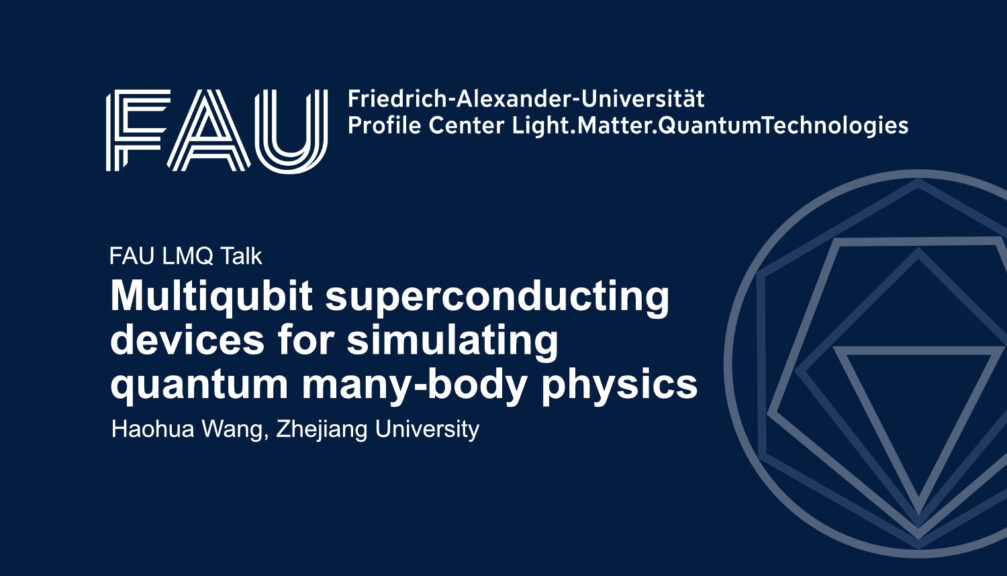We are happy to announce a talk on Friday, 20.09.24., 13:00-14:00 at HF, entitled “Multiqubit superconducting devices for simulating quantum many-body physics”.
The talk will be held by Haohua Wang from Zhejiang University and is open to everyone. The talk is given in hybrid form, so you can both join live or virtual via zoom:
- Live at the lecture hall F (Physikum HF, Staudtstraße 5, Erlangen)
- Virtual, via Zoom: Meeting-ID: 643 9262 8072 Kenncode: 590693
Abstract
Superconducting qubits provide a promising platform for simulating intriguing phenomena in quantum many-body systems. The simulation efficiency depends on various intertwining factors, including the underlying circuit architecture, the number of highly coherent qubits that can be precisely controlled and measured, and the upper-level simulation protocol. In this talk, I will introduce the multiqubit superconducting devices that are being developed at Zhejiang University. These devices are fabricated using the flip-chip recipe, with frequency-tunable transmon qubits and couplers located on the sapphire substrate and the control/readout wirings on the silicon substrate. The coupler is of transmon type, which is used to adjust the effective coupling strength between two neighboring qubits. For our devices, the median lifetime of the frequency-tunable qubits on a single chip is above 100 microseconds; the median single- and two-qubit gate fidelities can be above 99.96% and 99.5%, respectively. The decent device performance enables us to execute complex digital quantum circuits to simulate quantum many-body dynamics and other intriguing phenomena. In particular, we implement a quantum simulation protocol to realize a distinct type of non-equilibrium state of matter, a Floquet symmetry-protected topological phase, which breaks the time translational symmetry only at the boundaries and has trivial dynamics in the bulk.

We are happy to announce a talk on Friday, 20.09.24., 13:00-14:00 at HF, entitled “Multiqubit superconducting devices for simulating quantum many-body physics”.
The talk will be held by Haohua Wang from Zhejiang University and is open to everyone. The talk is given in hybrid form, so you can both join live or virtual via zoom:
Abstract
Superconducting qubits provide a promising platform for simulating intriguing phenomena in quantum many-body systems. The simulation efficiency depends on various intertwining factors, including the underlying circuit architecture, the number of highly coherent qubits that can be precisely controlled and measured, and the upper-level simulation protocol. In this talk, I will introduce the multiqubit superconducting devices that are being developed at Zhejiang University. These devices are fabricated using the flip-chip recipe, with frequency-tunable transmon qubits and couplers located on the sapphire substrate and the control/readout wirings on the silicon substrate. The coupler is of transmon type, which is used to adjust the effective coupling strength between two neighboring qubits. For our devices, the median lifetime of the frequency-tunable qubits on a single chip is above 100 microseconds; the median single- and two-qubit gate fidelities can be above 99.96% and 99.5%, respectively. The decent device performance enables us to execute complex digital quantum circuits to simulate quantum many-body dynamics and other intriguing phenomena. In particular, we implement a quantum simulation protocol to realize a distinct type of non-equilibrium state of matter, a Floquet symmetry-protected topological phase, which breaks the time translational symmetry only at the boundaries and has trivial dynamics in the bulk.